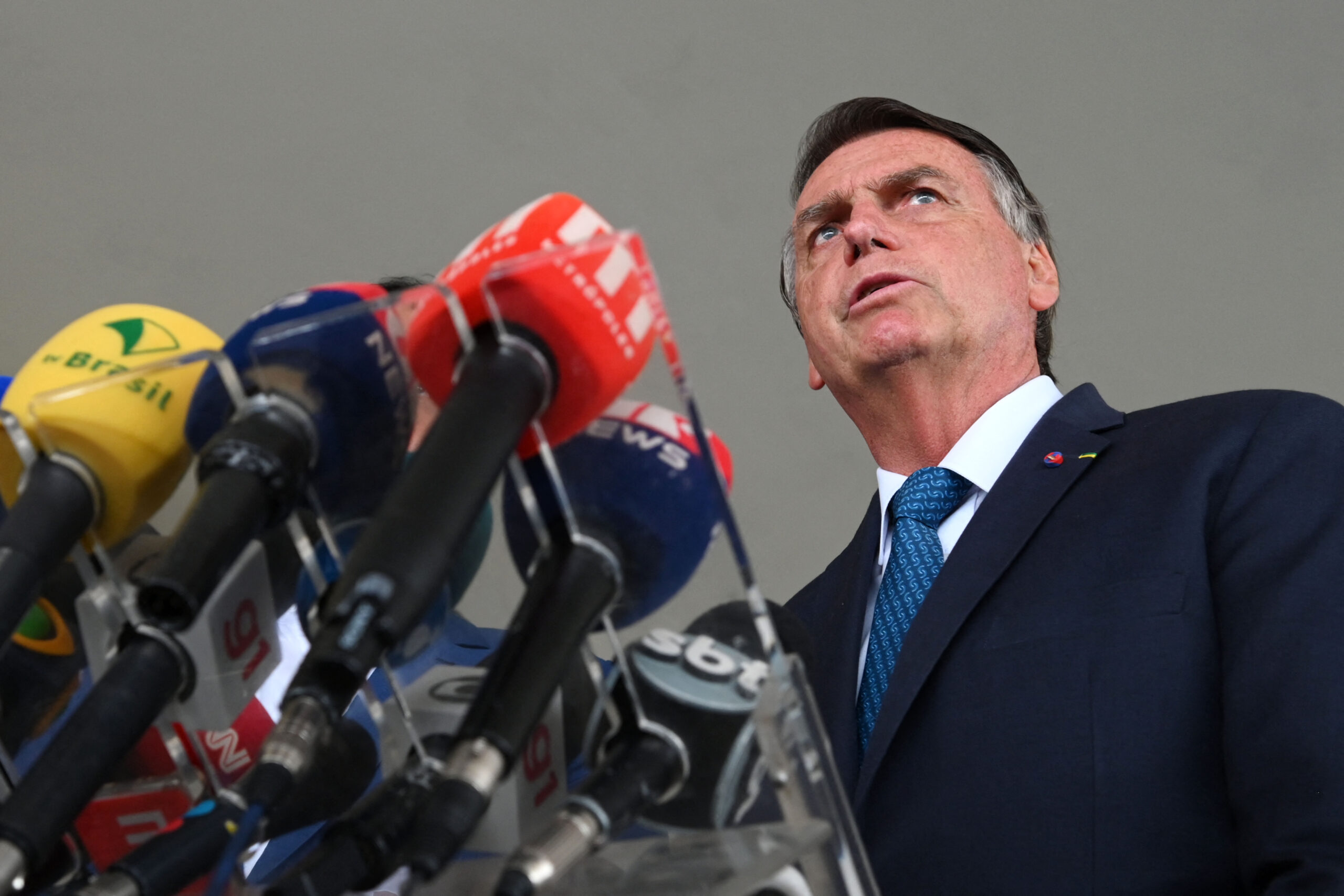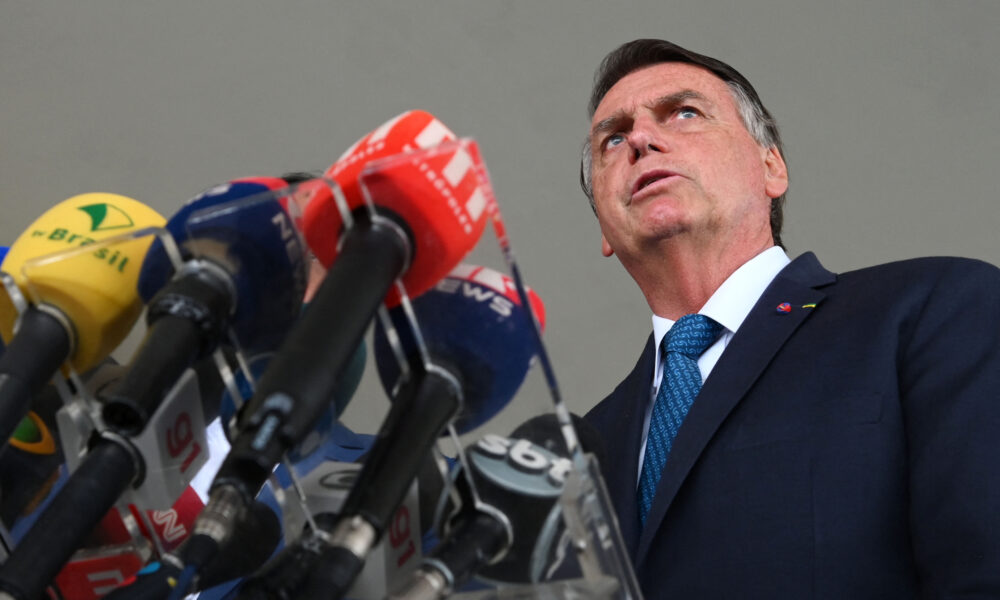International
Bolsonaro scores key endorsements for Brazil runoff

AFP
Far-right incumbent Jair Bolsonaro received several key endorsements Tuesday for Brazil’s presidential runoff election, including from influential corruption buster Sergio Moro, his one-time justice minister, who had quit his administration in protest in 2020.
Bolsonaro and his leftist challenger, ex-president Luiz Inacio Lula da Silva, are both aggressively chasing endorsements for their October 30 showdown, after the incumbent finished a closer-than-expected runner-up in Sunday’s first-round election.
“Lula is not an option,” Moro, the ex-judge who led the massive “Car Wash” graft investigation, wrote on Twitter.
“His government was stained by the corruption of democracy,” he said. “I declare my support for Bolsonaro in the second round.”
Moro is famous as the judge who jailed Lula, the biggest name felled in “Car Wash,” which uncovered a sprawling web of corruption that stole billions from state-run oil company Petrobras.
Moro resigned his judgeship to become Bolsonaro’s justice minister in 2019, but quit the following year, accusing the president of interfering in police investigations that targeted his inner circle.
The resignation was hugely damaging for Bolsonaro, who had run on an anti-corruption platform.
But the president said all that was now “water under the bridge.”
“From here on, it’s a new relationship,” he said. “There are no scores to settle.”
Brazil’s Supreme Court annulled Lula’s controversial corruption convictions last year, ruling Moro was biased in the case.
Moro tried to make a presidential run himself this year, but failed to garner enough support and opted instead for the Senate, winning a seat for the southern state of Parana.
Bolsonaro also got endorsements from the governors of Brazil’s second- and third-biggest states, Minas Gerais and Rio de Janeiro — newly re-elected Romeu Zema and Claudio Castro, respectively.
He also scored one from outgoing Governor Rodrigo Garcia of Sao Paulo, Brazil’s most populous and wealthiest state, who lost his own re-election bid.
International
Iran Reports 201 Dead, 747 Injured After U.S. and Israeli Strikes

The Iranian Red Crescent Society reported Sunday night (local time) that at least 201 people were killed and 747 injured following attacks carried out by Israel and the United States against the Islamic Republic.
A spokesperson for the humanitarian organization said more than 220 rescue teams have been deployed across affected areas and that relief operations are continuing without interruption. The official highlighted the difficulty of treating the large number of wounded and the urgent need for additional resources in impacted provinces.
Out of Iran’s 31 provinces, 24 have reported damage, according to a statement carried by the Isna news agency. This marks the first overall casualty toll released by Iranian state-affiliated media since the launch of the offensive.
Among the dead are 85 schoolgirls from a school in the southern city of Minab, according to the country’s judiciary. “The number of martyrs at the Minab girls’ school has risen to 85,” the local prosecutor’s office said, as quoted by the judiciary’s website, Mizan Online.
Iranian President Masud Pezeshkian described the attack as a “savagery” that “constitutes a new black page in the record of countless crimes committed by the aggressors.”
Meanwhile, the international community continues to monitor the situation closely amid concerns about possible further reprisals and the broader impact on Middle East stability, energy markets, and global security.
AFP noted that it was unable to independently verify the casualty figures or the circumstances surrounding the events.
International
Pope Leo XIV Urges End to ‘Spiral of Violence’ in Middle East

Pope Leo XIV on Sunday called for an end to the “spiral of violence” in the Middle East, following military strikes by the United States and Israel against Iran and subsequent retaliatory bombardments in the region.
“Faced with the possibility of a tragedy of enormous proportions, I urge the parties involved to assume their moral responsibility and stop the spiral of violence before it becomes an irreparable abyss,” the pontiff told the crowd gathered in St. Peter’s Square at the Vatican.
Speaking during the Angelus prayer, the U.S.-born pope said stability and peace cannot be achieved through threats or weapons. “Stability and peace are not built with reciprocal threats or with arms that sow destruction, suffering and death, but only through reasonable, sincere and responsible dialogue,” he declared.
The leader of the world’s 1.4 billion Catholics also called for diplomacy to “regain its role” amid escalating tensions.
In addition, the pope urged Afghanistan and Pakistan to urgently resume dialogue after several days of clashes between the two countries.
International
Security Council to Hold Emergency Meeting on Middle East Crisis

UN Secretary-General António Guterres on Saturday condemned the “military escalation in the Middle East” following attacks by the United States and Israel against Iran and Tehran’s retaliatory strikes, just hours before an urgent meeting of the UN Security Council.
“I call for the immediate cessation of hostilities and de-escalation,” Guterres said in a statement.
The Security Council is scheduled to meet on Saturday at 21:00 GMT (4:00 p.m. in New York) to address “the situation in the Middle East,” the United Nations announced.
The meeting, during which Guterres will deliver remarks, was convened at the request of France, Bahrain, Colombia, Russia and China, according to a diplomatic source.
-

 International5 days ago
International5 days agoFamily of “El Mencho” Seeks Return of Body After Deadly Military Operation
-

 International5 days ago
International5 days agoLarry Summers Steps Down from Harvard Role Amid Epstein Controversy
-

 International5 days ago
International5 days agoIran’s President Optimistic Ahead of Geneva Nuclear Talks with U.S.
-

 International5 days ago
International5 days agoBill Gates Admits “Serious Mistake” Over Epstein Ties
-

 International5 days ago
International5 days agoStephen Hawking Photo Appears in Newly Released Epstein Documents
-

 International4 days ago
International4 days agoCocaine Production Surges 34% in 2023 as Market Expands into Africa and Asia
-

 International3 days ago
International3 days agoTrump Floats “Friendly Takeover” of Cuba Amid Rising Tensions
-

 International20 hours ago
International20 hours agoIran Reports 201 Dead, 747 Injured After U.S. and Israeli Strikes
-

 International4 days ago
International4 days agoFederal Judge Blocks Trump Policy Allowing Deportations to Third Countries
-

 International3 days ago
International3 days agoArgentina’s Senate Reviews Milei-Backed Labor Overhaul
-

 International2 days ago
International2 days agoSecurity Council to Hold Emergency Meeting on Middle East Crisis
-

 International20 hours ago
International20 hours agoPope Leo XIV Urges End to ‘Spiral of Violence’ in Middle East
-

 Sin categoría2 days ago
Sin categoría2 days agoTrump: ‘We Think It’s True’ Amid Claims Iran’s Supreme Leader Was Killed
-

 International4 days ago
International4 days agoClinton Accuses Republican Committee of Using Epstein Case to Shield Trump






























